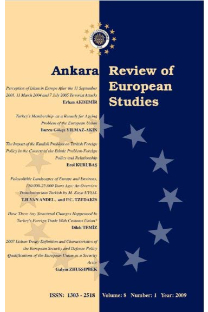Temel Hakların Korunması Üzerine Yeni Bir Kurum: Türk Ombudsmanlık Kurumu
Türk Parlamentosu 2012 yılında Ombudsmanlık Kurumu kurulmasına dair bir Kanun kabul etmiştir. Mart 2013’te Türkiye-Avrupa Birliği entegrasyonu sürecinin bir parçası olarak Türk Ombudsmanlık Kurumu OK Ankara’da faaliyete başlamıştır. OK kamu idarelerinin işlemlerine karşı yapılacak başvuruları incelemekle görevlendirilmiştir. Bu kurumun kurulması, AB ile yapılan müzakerelerde Katılım Ortaklığı’nın gereklerinden birisinin yerine getirilmesi açısından önemli ve kritik bir adım olmuştur. Bu makale, Türk ombudsmanlık modelinin analizini etmektedir. Makalede, Kurumun normatif olarak hukuki yetkileri ile zayıf ve güçlü yanları ile reform ihtiyacı analiz edilmektedir. Makalede, Kurum Başdenetçisi ile Denetçilerin seçilmesi, kurumun kurulması süreci ve bu bağlamda Kurum mevzuatının yasal çerçevesi, yapısal özellikleri, temel nitelikleri ve mevzuatın kapsamı ile yapılacak inceleme sonucunda tanınan yasal çareler de izah edilmektedir
Anahtar Kelimeler:
İdari hukuk, AB hukuku, Türk hukuku, temel haklar, Ombudsmanlık
THE NEW INSTITUTION ON PROTECTION OF FUNDAMENTAL RIGHTS: TURKISH OMBUDSMAN INSTITUTION
The Turkish Parliament in 2012 adopted a law establishing an Ombudsman Institution OI . In March, 2013, a modern Turkish OI Kamu Denetçiliği Kurumu became operational in Ankara, as a part of the Turkish-European Union EU rapprochement process. It is crucial and important step forward for the country, as it fulfilled one of the requirements for the Accession Partnership, and contributed to the monitoring of public administration. The OI could be responsible for handling petitions in public administrations. This article sets out an analysis of the Turkish ombudsman model. It describes the normative competences and analyses the strengths and weakness of the OI in Turkey and the need for reform. It explains the underwent procedure on establishment of the institution and appointment of the Chief Ombudsman and Ombudspersons
Keywords:
Administrative law, EU law, Turkish law, Fundamental rights, Ombudsman,
___
Colin Crawford, 6(4), ‘Consistency and Inconsistency for Ombudsmen', Jour- nal of Local Government Law (2003), pp. 72-76.Colin Crawford, ‘Rule of law, Lawyers or Ombudsmen?’, 4(4), Journal of Local Government Law (2001), pp. 73-79.
Hasan Tahsin Fendoğlu, ‘Public Auditorship (Ombudsmanship) and Right to Constitutional Complaint to the Constitutional Court’, 4, Review of Ankara Bar (2013), pp. 23-49.
Howard Elcock, ‘The Polish Ombudsman and the Transition to Democracy’, 45(3), International & Comparative Law Quarterly (1996), pp. 684-690.
Máté Szabó & Barnabás Hajas, ‘Proceedings of the Constitutional Court and the Ombudsman’s Activity: First Steps in Practice on the Basis of Regulation of the Basic Law’, 13, Romanian Journal of Political Science (Summer 2013), p. 5.
Mary Seneviratne, ‘A new ombudsman for Wales’, Spring Issue, Public Law (2006), pp. 6-14.
Michael Gİtze, ‘The Danish Ombudsman A national watchdog with selected preferences’, 6(1), Utrecht Law Review (2010), pp.33-50, p. 34.
Milan Remac, ‘Standards of Ombudsman Assessment: A New Normative Concept?’, 9(3), Utrecht Law Review, (2013), pp. 62-78.
Polona Tepina & Miha Modic, ‘The Human Rights Ombudsman of the Repub- lic of Slovenia’, 5, Slovenian Law Review , (2008), p. 77-93.
Rafal Pelc, ‘Polish model of relations between ombudsmen and judicial bod- ies’, one of the written contributions presented in International Conference on ‘the relationship between Ombudsmen and Judicial Bodies’ held in 12 and 13 November in 2001, Ljubljana, Slovenia.
Uluç Çağatay, Ahmet Uçar, Recep Arslan, ‘Kamu Denetçiliği Kurumu’nun Yerel Düzeyde Algılanması: İzmir ve Manisa Barosuna Kayıtlı Avukatlar Üzerine Bir Araştırma’, 1, Journal of Süleyman Demirel University Institute of Social Sciences (2013), pp. 51-68.
Yasin KURBAN, ‘From of the “Divân-ı Mezâlim” to the Ombudsmanshıp: Historical Background of the Ombudsmanship’, 52, Journal of EKEV Academy (2012).
Zehra Odyakmaz, ‘Identification of Ombudsman Institution and Evaluating Some Art.s of the Law N. 6328’, 14, Journal of Turkey Academy of Justice (Türkiye Adalet Akademisi Dergisi) (2013), p.1-85. Books
Bengt Wieslander, The Parliamentary Ombudsman in Sweden, Second revised edition, (Stockholm 2005).
Claes Ekhlundh, ‘The Swedish Parliamentary Ombudsman System’ in Kamel Hossain, eds., Human Rights Commissions and Ombudsman Offices, Kluwer Law International, (The Hague 2001). 3) Gabriele Kucsko-Stadlmayer, European Ombudsman-Institutions: A compara- tive legal analysis regarding the multifaceted realisation of an idea, (Springer; 1st edition, Wein:Newyork October 24, 2008), p. 2. 4) Kucsko-Stadlmayer, Gabriele (ed.), European Ombudsman-Institutions: A comparative legal analysis regarding the multifaceted realisation of an idea, Springer; 1 edition (Wein:Newyork October 24, 2008).
Linda C. Reif, The Ombudsman, Good Governance, and the International Human Rights System, Martinus Nijhoff Publishers, (Leiden and Boston 2004).
Trevor Buck, Richard Kirkham, Brian Thompson, The Ombudsman Enterprise and Administrative Justice, Ashgate Publishing Company, ( London 2011).
- ISSN: 1303-2518
- Yayın Aralığı: Yılda 2 Sayı
- Başlangıç: 2001
- Yayıncı: Ankara Üniversitesi Avrupa Toplulukları Araştırma ve Uygulama Merkezi
Sayıdaki Diğer Makaleler
Sermayenin Serbest Dolaşımı Faslı Kapsamında Yabancıların Türkiye’de Gayrimenkul Edinimi
EUROPEAN UNION and THE MEDITERRANEAN: BEFORE and AFTER THE ARAB SPRING
Temel Hakların Korunması Üzerine Yeni Bir Kurum: Türk Ombudsmanlık Kurumu
Avrupa Birliği ve Akdeniz: Arap Baharı Öncesi ve Sonrası
Avrupa Birliği’nde Devlet Yardımlarının Denetimi
THE NEW INSTITUTION ON PROTECTION OF FUNDAMENTAL RIGHTS: TURKISH OMBUDSMAN INSTITUTION
